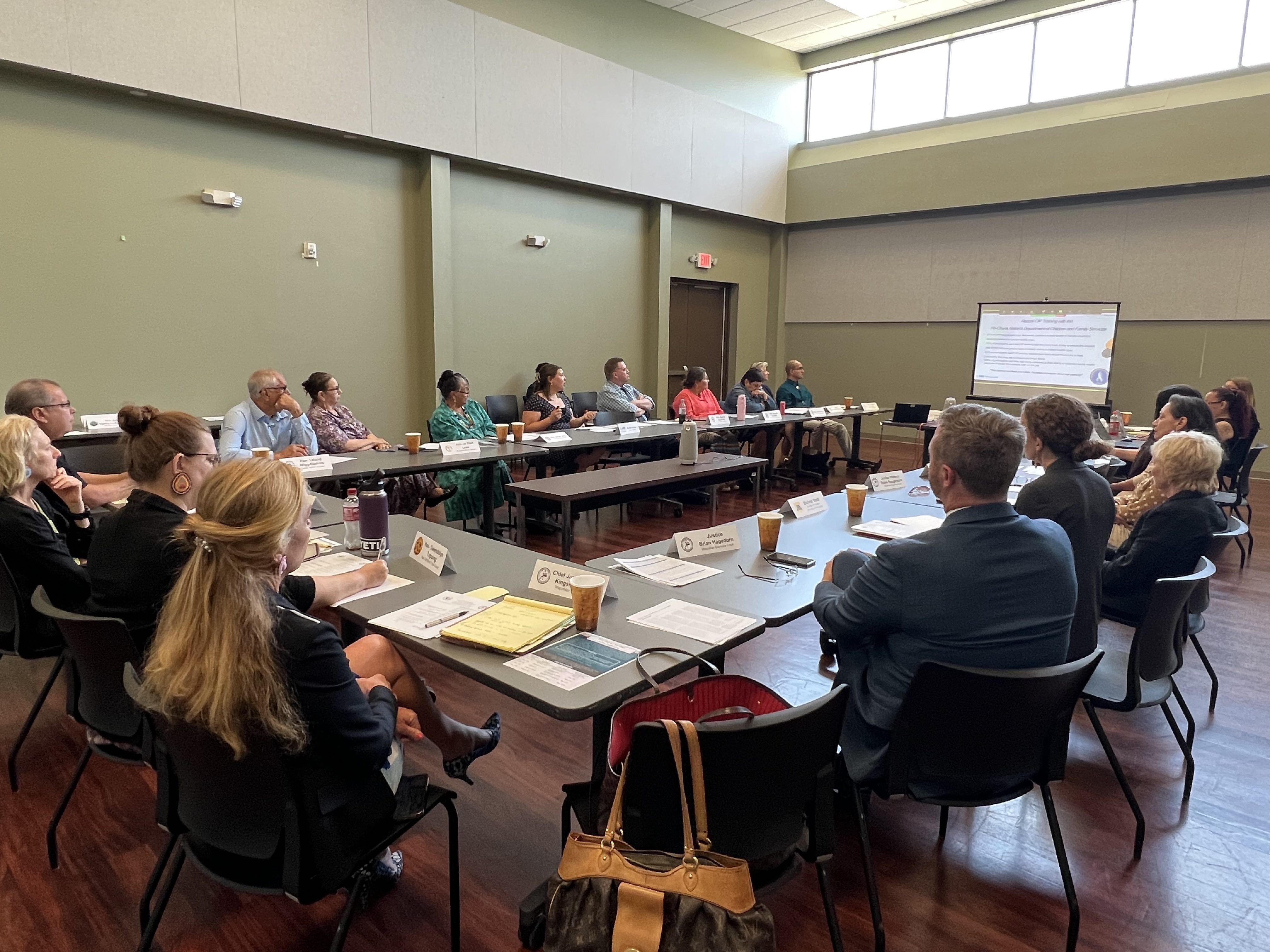On June 9, members of the Wisconsin Supreme Court and the Wisconsin Tribal Judges Association gathered at the Ho-Chunk Nation Community Center in Madison. Chief Justice Annette Kingsland Ziegler, Justice Jill Karofsky, the Supreme Court’s tribal liaison, and Red Cliff Tribal Judge Gwen Topping, President of the Wisconsin Tribal Judges Association (WTJA), welcomed attendees. Since 2017, tribal court leaders from Wisconsin’s 11 tribal communities and the Court have gathered every other year to exchange ideas and explore areas of mutual interest.
The meeting also included an update on the federal Indian Child Welfare Act (ICWA) and the state-level codification of ICWA, the Wisconsin Indian Child Welfare Act (WICWA). Children’s Court Improvement Program (CCIP) Director Bridget Mauerman and Stephanie Lozano, who is the Tribal Liaison for the Wisconsin Department of Children and Families (DCF), outlined the impact of WICWA implementation, including improvements in foster care and adoptive placement of tribal children with relatives or other tribal families.

The 2023 meeting began with a presentation from Skye Alloway, Manager of the Forest County Potawatomi’s Cultural Preservation Division and co-chair of the Missing and Murdered Indigenous Women’s Task Force. Alloway chronicled the group’s work and its focus on reducing the high rate at which indigenous women are victims of violent crime. The work of the task force will culminate in the coming months with recommendations focused on improved data coordination, increased awareness, and training for law enforcement officers.
Several resources, including a detailed judicial WICWA checklist, E-Learning modules, and other resources from the DCF also support adherence to WICWA’s highly-specific requirements. Judge JoAnn Jones of the Ho-Chunk Nation Tribal Court recounted her own personal experience of family separation and attendance at a state school for tribal children. She underscored the importance of protecting tribal children and fostering the preservation of Wisconsin’s indigenous cultures and languages.
Additional presentations focused on access to legal services and health care in rural, northern areas of the state. University of Minnesota Professor Michele Statz, who is based in Duluth, Minnesota, noted that around three-fourths of low-income residents face at least one civil legal issue, yet very few have access to legal aid. Other challenges include regional shortages of attorneys, mental health and substance abuse treatment services, transportation, affordable housing, as well as a lack of cellular phone service and high-speed internet. These problems are often amplified in tribal communities, which tend to have disproportionately high levels of poverty when compared with the state average. She emphasized the need for solutions to be focused on addressing these specific rural and regional challenges, rather than being based on what works for larger, more urban metropolitan areas.
Finally, attendees discussed how courts may better address mental health-related issues. Emilie Smiley, Program Director with the National Alliance on Mental Illness’s Wisconsin affiliate, (NAMI-Wisconsin) described crisis intervention training programs offered by NAMI through its state and regional affiliates. Seminars include a 40-hour Crisis Intervention Team (CIT) training for law enforcement officers and a 16-hour Crisis Intervention Partners course for community members. Both programs focus on tools and strategies to appropriately support individuals who are experiencing a mental health crisis.
At the conclusion of the meeting, Judge Topping and Chief Justice Ziegler reiterated the importance of maintaining the important relationships and thanked the presenters and attendees for sharing their stories.
Third Branch eNews is an online monthly newsletter of the Director of State Courts Office. If you are interested in contributing an article about your department’s programs or accomplishments, contact your department head. Information about judicial retirements and judicial obituaries may be submitted to: Sara.Foster@wicourts.gov

